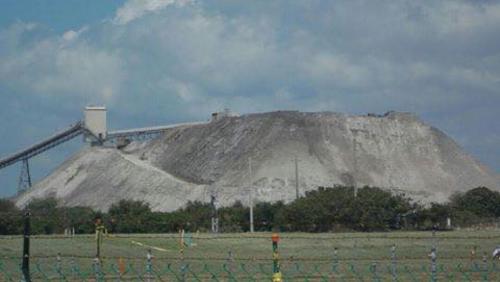US: Rolling Back Coal Ash Rules Threatens Health
EPA Proposal Effectively Subsidizes Coal Plants
The United States Environmental Protection Agency’s proposal to significantly weaken rules governing coal ash, a toxic byproduct of burning coal, poses a serious threat to public health and will make air and water pollution worse, Human Rights Watch said in a submission opposing the proposed changes on Oct 15, 2019.

A coal ash pile in Guayama, Puerto Rico
“President Trump has repeatedly touted the need for clean air and water while his administration guts rules to accomplish that,” said Sarah Saadoun, business and human rights researcher at Human Rights Watch. “The EPA is not only selling out the health of the mostly rural communities near coal ash disposal sites but also asking the public to effectively subsidize one of the most significant contributors to climate change.”
Coal plants across the United States produce 110 million tons of coal ash per year, making it the country’s largest waste stream after household trash. Coal ash, a grey-black powdery substance, contains numerous elements dangerous to human health, including known carcinogens such as arsenic, hexavalent chromium, and radium.
Utilities sell about 45 percent of coal ash produced for reuse in other materials, such as concrete, and dispose of the remainder in almost 900 sites nationwide. Among other concerning changes, the EPA is proposing to remove key rules to manage environmentally dangerous coal ash piles, essentially piles of the waste stored out in the open.
Following a catastrophic coal ash spill in 2008, the EPA enacted a rule in 2015 that requires coal-powered utilities to monitor, prevent, and remediate coal ash pollution. Six million people live in areas protected by this rule, according to the EPA, many of whom rely for their water on private wells that the government does not monitor or regulate.
The 2015 rule required coal-fired power plants to monitor groundwater for pollution. Data reviewed by EarthJustice, a non-profit environmental group revealed that 240 of the 265 plants reporting in response to this rule since March 2018 found toxic substances at levels exceeding federal standards. Rules also require control from air pollution, which is also a serious health risk for people living near coal ash landfills or piles.
At the request of an energy company, AES, the EPA is proposing to exempt coal ash piles, which are accumulations of coal ash that generally lack any structure or liner to prevent pollution, from the 2015 regulations. AES is a Virginia-based company operating a 400,000-ton coal ash pile near residential communities in Guayama, Puerto Rico.
AES groundwater monitoring found toxic metals leaching into the groundwater beneath their coal ash pile. That water forms part of an aquifer that is the sole source of drinking water for 140,000 people, according to a local media report. Data indicating an increase in cancer and other chronic diseases in the communities closest to the coal plant, as well as scientific research conducted near a coal ash landfill in Louisville, Kentucky, raise serious concerns regarding the public health risks of coal ash pollution.
The AES petition asked the EPA to exempt coal ash piles from current regulations that require it to monitor, prevent, and correct pollution because they “greatly increase the cost to produce baseload electricity using coal.” If the EPA allowed companies to avoid these costs it would effectively shift the burden of cleaning the pollution and its health impact onto the public. Utilities have already asked authorities to raise rates for consumers to help pay for coal ash cleanup.
Climate change also exacerbates the public health risks of coal ash contamination because there are more frequent and extreme storms. Heavy rains from Hurricane Florence that hit North Carolina in 2018 eroded a coal ash landfill, spilling the toxic ash onto a local roadway, and later breached a dam that sent coal ash spilling into a nearby river. After Hurricane Maria pounded a coal ash pile in Puerto Rico with 15 inches of rain, tests of a monitoring well found that arsenic levels doubled.
The risk that this rule change would lead to costly coal ash clean-ups financed by the public is especially worrisome in light of separate EPA measures regarding coal ash. In August, the EPA proposed not to require utilities to set aside funds in case of pollution and in 2018, the agency finalized a rule change to allow states the flexibility to suspend the rules’ requirements in certain situations.
“Only utility companies benefit from this rule change,” Saadoun said. “One way or another, the public will pay the price: with community health, property values, pollution cleanup, and, the climate.”
Source:Human Rights Watch
- 466 reads
Human Rights
Fostering a More Humane World: The 28th Eurasian Economic Summi

Conscience, Hope, and Action: Keys to Global Peace and Sustainability

Ringing FOWPAL’s Peace Bell for the World:Nobel Peace Prize Laureates’ Visions and Actions

Protecting the World’s Cultural Diversity for a Sustainable Future

Puppet Show I International Friendship Day 2020

